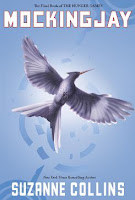Book: Mockingjay
Author: Suzanne Collins
Published: 2010
Source: Local Library
Spoilers for books 1 and 2 ahead. Duh.
With her home district burned to ash and the war started in earnest, Katniss Everdeen is once again in over her head. She should be pretty comfortable there, though--it’s where she’s been ever since volunteering for the Hunger Games.
Hidden among the secret rebel enclave of District 13 (long thought to have been destroyed in the last uprising), she can do very little except obsess over the course of the war that she’s partially responsible for igniting, and the fate of Peeta, who keeps turning up in broadcasts from the Capitol begging Katniss for a cease-fire.
When the rebels ask her to be the Mockingjay--the public face of the war, the rallying point--she agrees because it’s something she can finally do. But it turns out to be more of the scripted, image-conscious symbolism that has defined her since the beginning of the Hunger Games, leaving Katniss uncertain about her very identity.
Is she a tribute? A victor? The girl on fire? The Mockingjay? Is she Gale’s lover? Is she Peeta’s? Is she a soldier, a warrior, or a symbol? All of these? None of these?
Who is Katniss Everdeen?
As the third book in a rollercoaster trilogy, how does this hold up? I’d say pretty well until it falters a little at the end. It kinks a little sideways away from our expectation of a flash-boom-bang ending, and gently coasts to a stop instead. This isn't a flaw, exactly, just something that took me off-guard.
From the beginning, where Katniss must work through all the recent upheavals in her life by creating a mantra of the things she knows to be true, through to the end, where a character with a slippery grasp on reality attempts to sort out untrustworthy memories by asking “real or not real,” this book wrestles with truth vs. illusion. In this book, even more so than the first two, Collins is obsessed with public image, and the uses of it for propaganda. Both sides of the war use Katniss (and to a lesser extent, Peeta) to twist public opinion like a pretzel. But Katniss is not cut out to be a puppet for anybody. This is shown dramatically when the first scripted, studio-filmed attempts at propaganda spots are a dismal failure. She is most effective when she’s saying nobody’s words but her own.
Of course, this doesn't always fall in the lines of what the rebels want. Collins also broods on the cost of war to everyone involved. It becomes less good-guys-vs-bad-guys as all of humanity rapidly destroying itself. This switch in tone from the earlier two books, in which the Capitol and President Snow were very clearly the villain, contributes to the ending that you don't expect but is the only thing that could work.
Maybe it’s our reality show culture, but we want someone who’s going to wind up a star (imagine jazz hands here). We pictured her as a leader of the revolution, a creator of truth and justice in the wake of the corrupt Capitol’s downfall, and a civilization builder. In short, it wasn’t enough for her to survive, we want her to triumph.
But the truth is that Katniss has always been a reluctant star at best. By the end of the book, she is so profoundly damaged by what she went through in the past few years that even surviving is a triumph. This book, like the others, will force you to think hard about any number of subjects even as it drags you through to the end.
Okay, enough analysis. I have to have a fangirl moment over the Best. Line. Ever: “You love me. Real or not real?” “Real.”
OH MAN.


2 comments:
That was a sweet line :) REAL.
Great review.
I love the connection between "reality" on TV and the real/not real.
Post a Comment